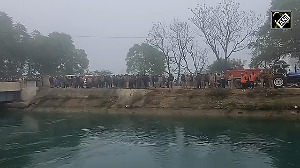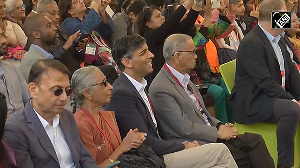After having failed to furnish the names of all the 22 dope-tainted athletes from the 32nd National Games last year, the Indian Olympic Association will have a tough day in Delhi on Wednesday when it gives them a personal hearing.
The doping controversy that has cropped up with charges and counter charges being traded by athletes and federations promises to make this hearing a difficult one.
The IOA's Medical Commission and Anti-Doping Commission, after its meeting last week, said it favours giving the sportspersons who tested positive for banned substances a personal hearing according to the rules of the International Olympic Committee and IOA.
But how much of truth will come out in the open is a matter of debate.
Prior to this doping scandal rocking the Indian sports scene, 19 athletes from the 31st National Games in Punjab had tested positive for dope. The IOA, however, has till date not furnished the names or details of the action taken against these sportspersons.
IOA secretary general Randhir Singh had on April 8 said that the names of all the 22 dope-tainted athletes would be announced after the IOA Medical Commission's meeting on April 23. He had not made the names public earlier, saying that he wanted the respective Federations, which had been notified about the athletes, to give their reports on the sportsperons' preference of laboratories, whether in India or abroad, for their 'B' sample tests in a bid to give them a fair chance.
However, only two Federations -- the Rowing Federation of India (RFI) and the Amateur Athletic Federation of India (AAFI) -- have till now come out with the names and the suspensions handed down to the athletes reported to them.
IOA Medical Commission chairman Dr Manmohan Singh said on Sunday in Patiala that the body is committed to take action against the tainted athletes in consultation with the federations.
The explanation of their circumstances and how they consumed the banned drug will also be examined in the hearing, Dr Singh had said.
And it is this question of circumstances of taking the drugs that is bound to stir up a hornet's nest, with one banned athlete already going on record stating she was forced to take performance-enhancing drugs by a state federation.
It is a well-known fact that athletes alone are not responsible for taking dope. They are administered by coaches and managers and sometimes even by the federations. Added to that is the role monetary incentives play in forcing an athlete to participate for a certain team and win -- a view that has even been endorsed by the All India Council of Sports (AICS) in its meeting in New Delhi more than a fortnight ago.
So, even as the IOA Medical and Anti-Doping Commission finalises the procedures of handing out suspensions and bans to the athletes as per the guidelines of the International Olympic Committe, the Olympic Council of Asia, the World Anti-Doping Ageny and the Olympic Movement Anti-Doping Code, one may not even get close enough to the real culprits.
UNI







 © 2025
© 2025